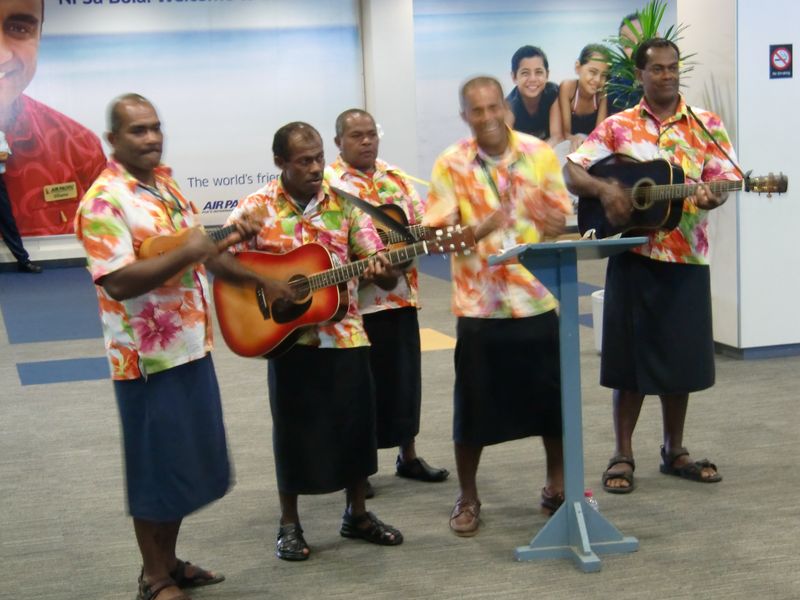
Peter Reith
Columnist
Sydney Morning Herald
Incoming Prime Minister Frank Bainimarama put himself before the citizens of Fiji and gave them the opportunity to decide the future of Fiji.
It is decades since I was on a family holiday in Fiji but I can report it's still a beautiful place and the people are still friendly. And now that Fiji has voted for democracy, the best Aussies can do for Fiji is to continue holidaying in even greater numbers.
Last Wednesday's election and the transition from military government and return to democracy could not have gone much smoother. There are a lot of dictators around the world who will never give up power. Putting the recent history behind, it has to be said that it is to the credit of the incoming Prime Minister, Frank Bainimarama, that he put himself before the citizens of Fiji and gave them the opportunity to decide the future of Fiji. He won 32 seats out of 50. Many Indo Fijians voted for Bainimarama; an outcome that the Opposition needs to consider in the future.
There were two significant catalysts to this shift to democracy. Firstly, a switch in Australian policy towards Fiji announced by Foreign Minister Julie Bishop in February 2014 and the decision by the Fiji government in March 2014 that it would hold elections by the end of September. The last Fijian election was 2006 and until this year, elections were twice promised but not implemented.
Needless to say, democracy is not a one-day wonder: Fiji will need to continue and improve the practice of democracy. The next step will be the opening of the new Parliament which will give the opposition a legitimate platform. All sides of politics in Fiji will need to adapt to the new democratic standards; the opposition needs to behave responsibly and to establish itself as a viable alternative to the government. The government's challenges include the need to bring civil society into the democracy tent and lessen restrictions on the media.
Once again, Bishop has demonstrated that she is a quality minister. Two things stand out. Firstly, the February policy change involved taking a punt that Fiji would move towards democracy. It was clear from the outset that no one really knew how well the voting would be conducted and no one was sure what would happen if the government lost office. It was a classic case of taking a risk to get a worthwhile outcome. And secondly, rather than shunning Fiji, she worked with the Fiji government and put in place the resources needed to complement Fijian efforts to run an election at short notice. In both cases, the approach turned up trumps for everyone.
The Multinational Observation Group (the MOG) was co-ordinated by Australia and we managed the involvement of more than 90 international observers through the Secretariat staffed by Australian Department of Foreign Affairs and Training staff. Australia was co-leader with Indonesia and the India and, separately, we also funded Australian experts to work inside the Fijian election office.
The observation work was not just on election day. We wanted to know what was happening on the ground well in advance of the election so we could understand the context for the vote. The task was to monitor and report back; the MOG was not running the election and it was not a commentator on politics. It was however, not shy in saying that its final report would not only suggest improvements for the future but it would point out what needed to be done before the election.
The preparation was comprehensive. Young Australian staffers were dispatched to remote islands to talk to local people about the election and people like former Kiwi MP, Wyatt Creech was walking the back blocks of Fiji for weeks before the election. Where there were complaints or otherwise, they were passed on to MOG.
On election day, the MOG covered 455 polling booths and about 31 per cent of all polling stations. The MOG also had its own discreet tally room thereby providing an independent check on the national results. On the day after the election, the MOG announced the "outcome of the 2014 Fijian election is on track to broadly represent the will of the Fijian voters and the conditions were in place for Fijians to exercise their right to vote freely".
It was the first time Australia had been given the lead for a MOG. I knew it went well when I heard that the observation specialists from the European Union said that we had done a good job "for non-experts". Maybe now Australia, India and Indonesia will build on the template established in Fiji for other elections in our region.
A new start for Fiji has much promise; an important role in Pacific affairs, economic growth, resumed relations with Australia and the Commonwealth and the benefits of democracy.
Peter Reith, a former Howard government minister, was appointed by Foreign Affairs Minister Julie Bishop as co-leader of the Multinational Observation Group for the Fiji elections on September 17.
Source:http://www.smh.com.au/comment/keep-holidaying-in-fiji-for-democracys sake-20140922-10kab6.html#ixzz3EBLcIF3k
Fijileaks Editor:
The Fijian Elections Office has clarified that provisional results for SODELPA candidate Vane Seruvakula were wrongly entered.
When provisional votes were released on the night of elections, Seruvakula had up to five thousand seven hundred votes – however this was not reflective in her final result.
“The provisional result for Vane Seruvakula was higher than the final and we found that in data entry there was a typo error and that’s what caused the high number of votes. But with the final results – with the three audit systems there is no mistake for the final vote.”
Saneem says they had insisted from the beginning that provisional results were to be dropped once final results were released. Source: FBC News.


